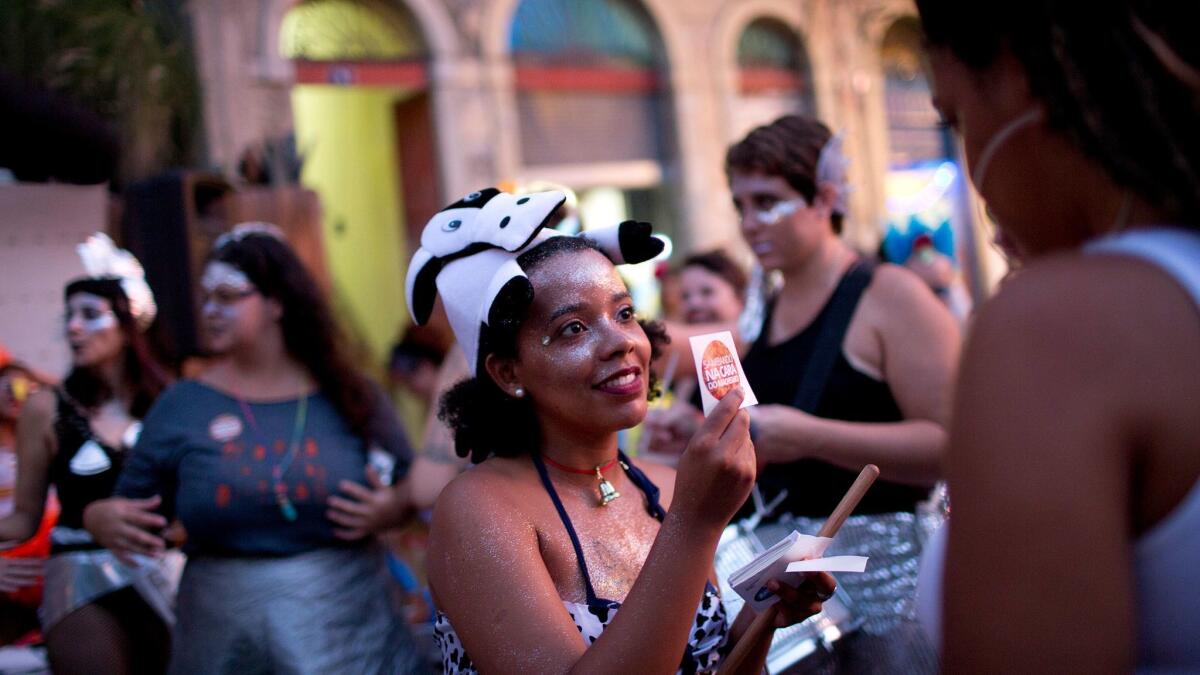Women in Brazil launch ‘No Means No’ anti-harassment campaign during Carnival

- Share via
Reporting from SAO PAULO, BRAZIL — For Aisha Jacob, the assault came in public, during a samba circle as scores gathered for Brazil’s joyous dance. A man kept making advances, and three times Jacob told him she wasn’t interested. Suddenly, he grabbed her by a leg and shoved his hand up her shorts.
The man was kicked out, but “I was shaken,” Jacob said. “When I told my girlfriends what happened, they started sharing their stories too. Every single one of them had something to say. They had all been through it before.”
The assault occurred last year just before Carnival, Brazil’s festive pre-Lenten celebration known for its big crowds, loud music, glittery costumes and hedonistic street parties. Jacob, a stylist from Rio de Janeiro, and other women decided it was time to speak out against sexual harassment and assaults during the street parties known as blocos.
According to feminist group Think Olga, 99.6% of women in Brazil have been catcalled. The Brazilian Forum on Public Security, a private group, also reports that every 11 minutes, a woman is raped in the South American country, but just 10% report their assaults.
Last year’s Carnival saw the number of sexual assault complaints across Brazil jump 90% compared to the same four days in 2016, according to the Secretariat of Policies for Women. The secretariat said the increase in complaints — which are registered when victims call 180, a number dedicated to reporting crimes against women — was a result of government campaigns to stop this type of violence.
Local governments across Brazil have launched campaigns in recent years to stamp out crimes against women during Carnival. Some states coined their own slogans, including Rio’s “costumes are not invitations,” Paraíba’s “forcing a kiss is a crime” and Bahia’s “respect the girls.”
Jacob and a group of friends decided to add their voices to the movement and create their own campaign, Não é Não, or No Means No. The best way to get their message across, they decided, was by putting it directly on their bodies.
“We had already been planning on having temporary tattoos made for our [Carnival] costumes,” she said. “There was a moment when we just looked at each other and said, ‘We have to make tattoos for women that say ‘no means no.’ We have to protect each other.’
“It wouldn’t make sense to have stickers made with that message. It had to be something that we could carry with us on our bodies.”
Within 48 hours, the friends created a WhatsApp group of 40 women to fund the production of 4,000 temporary tattoos. It was all done on the fly — nobody had planned on creating a campaign against sexual harassment and assault for Carnival’s kickoff the following week — but they managed to get them printed in time to hand them out for free to women at Rio’s blocos.
This year, the campaign has a much wider reach.
After setting up a crowd-funding page to lessen the burden on the 40 women they had counted on financially in 2017, Jacob was surprised to see how quickly they reached their first target of 4,000 tattoos for $2,360. She was even more shocked when the campaign almost tripled that amount. She and her friends were able to print 25,000 tattoos with the $6,443 raised from 355 donors.
With time to plan, Jacob and the four other women who work with her on production — Nanda Barbosa, Luiza Borges, Barbara Menchise and Julia Parucker — also created distribution partnerships with bloco organizers in São Paulo, Salvador, Belo Horizonte and Recife. This year’s Carnival started Friday and lasts till Feb. 13, the day before Ash Wednesday and the start of Lent.
Individual women who heard about the No Means No campaign have also volunteered to hand out the temporary tattoos in their cities, and plans for a new campaign for International Women’s Day are already underway.
While the campaign encourages and welcomes the support of men, Jacob wants to make it clear that No Means No is something created by women, for women. It’s not just a means of getting their message across to men, but also about creating a sense of security for women who want to attend blocos.
“With the tattoos, it’s easy to see who is a part of No Means No, so it creates a type of support group for women,” Jacob said. “If they need to ask for help, they know who they can reach out to. They know they’re not alone.”
Langlois is a special correspondent.
More to Read
Sign up for Essential California
The most important California stories and recommendations in your inbox every morning.
You may occasionally receive promotional content from the Los Angeles Times.












